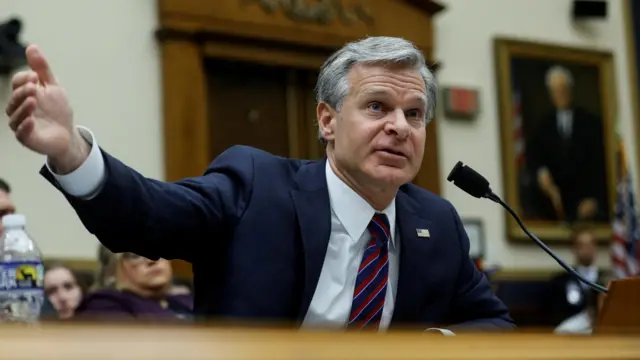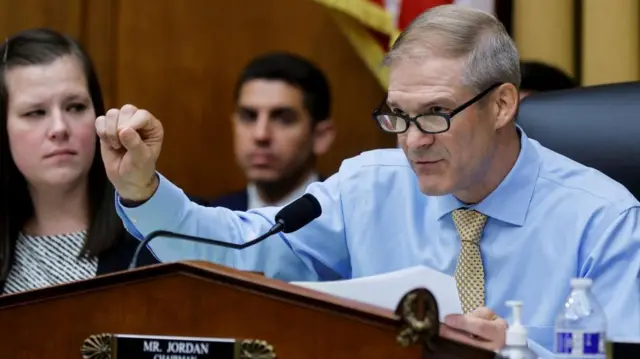That's a wrappublished at 20:55 BST 12 July 2023
After about 5.5 hours of questioning, the House Judiciary hearing has finished.
Our coverage today was brought to you by Brandon Livesay, Nadine Yousif and Anthony Zurcher.
Thanks for joining us.
FBI director Christopher Wray faces tough critics as he testifies in front of the Republican-controlled House Judiciary Committee
He is being quizzed on his leadership and the work of the bureau
Some Republicans, including former US President Donald Trump, have claimed the FBI has been "weaponised" against conservatives
The FBI is a federal agency and meant to be non-partisan, and some Democrats argue Republicans are trying to undermine its legitimacy
Its investigations into Trump, Hunter Biden, and the storming of the US Capitol on 6 January are all likely to be discussed
Edited by Brandon Livesay
After about 5.5 hours of questioning, the House Judiciary hearing has finished.
Our coverage today was brought to you by Brandon Livesay, Nadine Yousif and Anthony Zurcher.
Thanks for joining us.
As the hearing concludes, Christopher Wray reiterates that the FBI has not been "weaponised", but is rather working to protect the American people "from a staggering array of threats."
"Nobody gets to see the FBI the way that I do," he says.
He then fields additional questions from chairman Jim Jordan, including whether the FBI is assisting the investigation into cocaine that was recently found at the White House.
Wray responds the FBI's lab personnel conducted a test on the substance, adding that the agency has offered to help out more.
"Beyond that, I refer you to the Secret Service," Wray says.
 Image source, Reuters
Image source, ReutersChristopher Wray
The federal agency's director, Christopher Ray, has been on the stand since 10:00 local time answering questions from lawmakers. Here is some of what was said:
We’ve heard some more about the Durham report into the FBI’s handling of its investigation into alleged ties between Russia and the 2016 Trump campaign.
Scott Fitzgerald and Cliff Bentz, both Republicans, brought up the report - which concluded the FBI had not possessed evidence of collusion between Donald Trump's campaign and Russia before launching an inquiry.
Wray says he put in place a “whole slew of reforms” when he was made the FBI director, and the actions that led to the Durham report happened before he was part of the agency.
He says there are new safeguards in place, and all senior managers involved in that investigation are no longer with the FBI.
You can read more about the Durham report in this article.
When asked earlier in the hearing about the most dangerous threats observed by the FBI, Wray was quick to focus on fentanyl. He outlined that:
The hearing has now resumed.
We're still waiting to hear from a few members of the committee, so stay with us.
The hearing is still on a break, so let's revisit a moment from earlier.
Harriet Hageman, a Republican, repeated the accusation that the FBI is biased against conservative Americans.
She asked director Christopher Wray: "What are you prepared to do to reform federal law enforcement in a manner which earns back the trust of the American people?"
Wray, who has been a member of the Republican party, responded by saying: "the idea that I am biased against conservatives seems somewhat insane to me given my own personal background".
He adds that as director, he emphasises doing "the right thing, in the right way, and that means following the facts wherever they lead no matter who likes it".
 Image source, Reuters
Image source, ReutersThe hearing is taking a 30 minute break that will no doubt be welcomed by FBI director Christopher Wray.
He has spent the past three hours facing off with members of the House Judiciary Committee in some very fiery exchanges.
The hearing has been split between party lines, with Republicans attacking the FBI and the director, and Democrats defending the agency.
Stick with us as we continue to bring you the latest updates.
We've just heard from the the FBI director about a series of terror attacks that were recently thwarted by the FBI.
In response to questions by Republican Laurel Lee, Christopher Wray says Americans would be surprised to know that his agency has disrupted numerous terrorist plots under his leadership.
Among those were a planned attack against a 4 July parade in Ohio, as well as against churches and other houses of worship and a plot against a hospital during the Covid-19 pandemic.
He adds there were also plots against a pier in San Francisco and a crowded beach during the Memorial holiday weekend - all of which were stopped by the FBI.
Wray says these threats were not only domestic, but also from "jihadist terrorism".
In response to questions from Republican lawmaker Lance Gooden, Christopher Wray says China and its government pose a significant threat to the US.
"In my view, there is no country, none, that presents a broader, more comprehensive threat to our ideas, innovation and our economic security than the Chinese government," Wray says.
"In many ways it represents the defining threat of our era."
Wray speaks about China's requirement to have "committees" - or cells - within companies operating in China, whose function is to ensure the company complies with the Chinese communist government.
Gooden says he is concerned this law is being used on American companies operating in China.
"The CEOs I've talked to say they are afraid to say something," Gooden says.
During his questioning, Republican Chip Roy from Texas spars with Christopher Wray about whether the FBI is a "tyrannical" organisation.
Roy mentions the arrest of pro-life activist Mark Houck at his home during what Roy described as a raid.
"Do you think that was appropriate?" Roy asks.
Wray says that as director, he does not order specific operations and puts that trust in his experienced career agents on the ground.
"Your job is to review what they do, your job is to protect the American people from the tyrannical FBI," Roy says in a heated exchange.
"I could not disagree more of your description of the FBI as tyrannical," Wray responds.

 Anthony Zurcher
Anthony Zurcher
BBC North America correspondent
If congressional Republicans have a lot of complaints about the FBI, there are fewer things they can do about it.
They pledge to issue subpoenas, call whistle-blower witnesses and hold plenty of investigatory hearings, including through the House’s special “Subcommittee on the Weaponisation of the Federal Government”.
Those, however, will be conducted more for the publicity than to advance toward concrete actions.
The power Congress does have centres primarily around the control legislators have over federal spending.
Some Republicans have threatened to reduce the salaries of government officials they find insufficiently forthcoming to their inquiries, including FBI director Chris Wray.
Others have pledged to cut the overall budget of the FBI. House Judiciary chair Jim Jordan has suggested adding funding provisions that would force the FBI to move its headquarters from Washington, DC, to Alabama, where he believes it would be more insulated from political influence.
Republicans may also object to reauthorising of legislation that gives federal intelligence agencies broad powers to conduct foreign surveillance – including some that could include capture foreign communications with US citizens.
It’s all part of a conservative push to pare back the FBI’s investigatory powers, which many view as having been improperly used to target conservatives in general and former president Donald Trump in particular.
We're now hearing about the southwest border of the US, where the FBI director says there has been an "uptick" in "known or suspected terrorists" crossing into the US.
While answering a series of questions from Republican Tom McClintock, Wray says fentanyl trafficking is another serious issue on that same border.
"The cartels, working in a kind of unholy alliance with dangerous violent gangs in the US, are responsible not just for the abominable distribution of fentanyl… but the violence," he says.
A point repeatedly brought up by Republican lawmakers has been Section 702, but what exactly is that?
Section 702 is a key provision of the US Federal Intelligence Surveillance Act, which allows the FBI to monitor non-Americans outside the US to get foreign intelligence information.
This information is used "to protect the US and its allies from hostile foreign adversaries".
Ben Cline, a Republican lawmaker, was the latest to address Section 702, arguing that its surveillance has also been used to monitor Americans and their phone calls, emails and text messages.
"Do you honestly think it is fair to continue describing Section 702 as an authority targeted at only foreigners abroad?" Cline asks.
"I do," Wray responds.
"It looks like a framework that enables the FBI to spy on countless Americans," Cline says.
Wray then says that he "can't speak what it looks like to certain people".
According to the Department of National Intelligence website, a person targeted by Section 702 may communicate with or discuss information concerning a US citizen.
 Image source, Reuters
Image source, ReutersJim Jordan
A topic that has been repeated throughout the hearing is the FBI's use of citizens' data.
Republican committee chairman Jim Jordan shows Wray letters from Bank of America, in which the FBI asks the bank for information on customers in Washington, DC in the days around the 6 January Capitol riots.
"My understanding is that our engagement with Bank of America was fully lawful," Wray says.
Pramila Jaypal, a Democrat, also asks how the FBI uses commercial data.
Wray responds by saying this topic is tough to explain, and he would prefer to defer the matter to experts that can better answer the question.
Jaypal then asks if Wray knows the commerical data purchased provides location information on Americans.
Wray repeats that the issue is complicated. "I don't dispute that this is an important topic," he says, but adds it is not possible to get into it given the hearing's time constraints.
In a series of questions, Tedd Lieu, a Democrat, makes the point that much of Donald Trump's aides were convicted in federal court under judges that were appointed by Trump himself.
"What these facts show is that we don't have a two-tiered system of justice," Lieu says.
"We have one department of justice that goes after criminals regardless of party ideology."
He adds that it is not the fault of the FBI that "Trump surrounded himself with criminals".
Lieu then asks Wray what would happen if the FBI were to be defunded and dismantled, as some Republicans have called for.
Wray responds that the US would then have "hundreds more criminals on the street", as well as "scores of threats" from foreign actors and terrorists.
"Ultimately, the people most hurt by some ill-conceived effort to defund our agency are the American people," Wray says.
Democrat Eric Swalwell is up.
He has used some of his five minutes of allocated time to address his colleagues in Congress, whom he accused of asking Christopher Wray ludicrous questions instead of focusing on serious matters of national security.
"This hearing has turned into absolute chaos," he says, adding that Republicans have been focused on personal citizens' privacy and laptop security, rather than the mass shootings that have plagued the US.
"That is bananas," he says.
Adam Schiff, a Democrat, has asked Christopher Wray about domestic violent extremism.
In the first few years at the helm of the FBI, Wray says he saw a 40% increase in investigations into domestic violent extremism. And this was all "quite some time" before the US Capitol riots on 6 January, he says.
Wray says this type of domestic extremism can appear in many forms. It can be racially-motivated, a militia, run by anarchists, or environmentally motivated. Recently, he says, the FBI has seen the targeting of pro-life facilities.
In all cases, this type of extremism has to meet three criteria, Wray says:
Republican Darrell Issa brings up the FBI's role in censoring posts on social media, specifically in relation to the Covid-19 pandemic - a point that was also mentioned earlier in the hearing.
The Republican lawmaker asks whether the FBI has the authority "to take down the free speech of American citizens" on social media sites like Facebook or Twitter.
Wray says the FBI does not specifically ask social media companies to censor information.
"What we do is alert them when some other intelligence agency gives us information about a foreign intelligence service being behind some account," he adds.
"At the end of the day, we're very clear that it is up to the social companies to decide whether to do something about it or not."
Issa responds by saying if the FBI asks it, it carrys the weight of being a direct order.
 Image source, Reuters
Image source, ReutersChristopher Wray is now speaking about hostilities and threats that have been made against the FBI.
Speaking to Democrat Steve Cohen, he references an incident in which a person armed with an AR-style rifle and a nail gun attempted to attack the FBI's field office in Cincinnati.
Wray says that a review of the suspect's devices and social media posts showed he was hostile against the FBI.
"It is unfortunately part of a broader phenomenon that we have seen against law enforcement all across the country," Wray says.
The director says there have been calls for attacks not only on personnel themselves, but also their families.
Earlier, we heard from ranking Democrat Jerry Nadler that multiple credible death threats had been made against Wray last year.